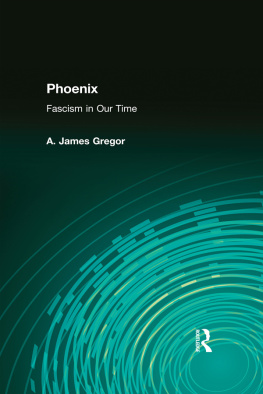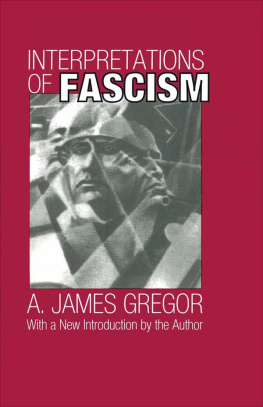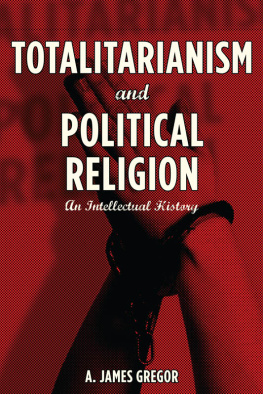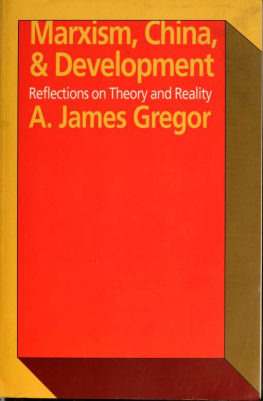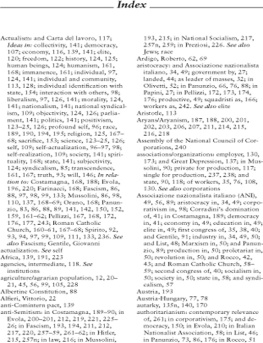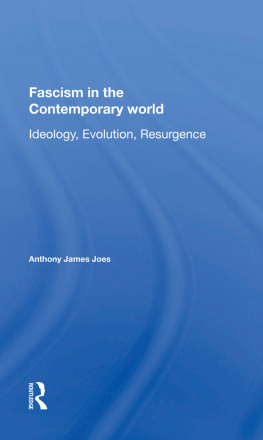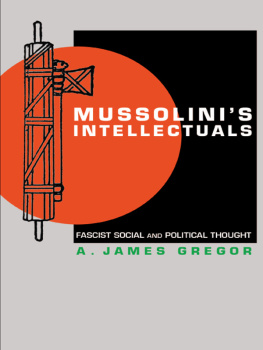Phoenix
Phoenx
Fascism in Our Time
A. James Gregor
with an introduction by Alessandro Campi
First published 1999 by Transaction Publishers
Published 2017 by Routledge
2 Park Square, Milton Park, Abingdon, Oxon OX14 4RN
711 Third Avenue, New York, NY 10017, USA
Routledge is an imprint of the Taylor & Francis Group, an informa business
Copyright 1999 by Taylor & Francis.
All rights reserved. No part of this book may be reprinted or reproduced or utilised in any form or by any electronic, mechanical, or other means, now known or hereafter invented, including photocopying and recording, or in any information storage or retrieval system, without permission in writing from the publishers.
Notice:
Product or corporate names may be trademarks or registered trademarks, and are used only for identification and explanation without intent to infringe.
Library of Congress Catalog Number: 99-20842
Library of Congress Cataloging-in-Publication Data
Gregor, A. James (Anthony James), 1929-
Phoenix : fascism in our time / A. James Gregor ; with an introduction by
Alessandro Campi.
p. cm.
Includes bibliographical references (p.) and index.
ISBN 0-7658-0855-2 (alk. paper)
1. Fascism. 2. FascismItaly. I. Title. II. Title: Fascism in our time.
JC481.G6926 1999
320.533 09049dc21
99-20842
CIP
ISBN 13: 978-0-7658-0855-4 (pbk)
This volume is dedicated to the memory of Renzo De Felice
who restored to Italy part of her history.
Contents
Alessandro Campi
Everyone who fashions a manuscript for publication puts himself, or herself, in debt to any number of others and to the institutions in which they are all housed. Like everyone else, I owe an inestimable debt to the University of California, Berkeley, for providing me facilities and access to students, both of which have made my work pleasurable and stimulating. The Research Center at the United States Marine Corps University at Quantico was my host as Oppenheimer Professor for the year 1996-97 in which substantial parts of this manuscript were put together. The officers and staff of the Marine Corps University proved to be gifted and principled critics of my work.
To Professor Irving Louis Horowitz, I owe not only collegial respect, but sincere admiration. To Professor Alessandro Campi, who wrote the brief preface to this volume, I owe gratitude for having read this manuscript before its publication. As a Visiting Scholar here at Berkeley, he and his charming wife brought some light into the sometimes darkness of Berkeley. To Mr. Leonid Kil, I owe gratitude for opening vistas on the richness of Russian political thought. To my wife, Professor Maria Hsia Chang, I owe all manner of good things I cannot enumerate other than the fact that she has provided me access to the richness of Chinese political thought.
Finally, to my students I owe gratitude for their patience and their genuine interest in the subjects that have engaged my attention for so long. Whatever is good in this volume is the consequence of the influence of all these people and these institutions. Whatever is not, is solely my responsibility.
A. James Gregor
Berkeley, Winter 1998-99
Among the scholars of international reputation studying fascism, A. James Gregor is one of the more stimulating and original. His studies on the rational nature of fascist ideology together with his interpretation of fascism as a dictatorial revolutionary mass movement of development, were articulated in the sixties and seventies in books like The Ideology of Fascism (1969), Interpretations of Fascism (1974), The Fascist Persuasion in Radical Politics (1974), Italian Fascism and Developmental Dictatorship (1979), and Young Mussolini and the Intellectual Origins of Fascism (1979). They were works that captured the attention of research specialists. Some of the theses argued in those volumes have been the object of academic discussions, and naturally, of criticism. Whatever else they have accomplished, the discussions, and the criticism, have indicated that the theses are relevant and innovative. Gregor has argued that there is a connection between fascism and economic and industrial modernization, as well as an ideological, political, and institutional relationship between the Fascism of Mussolini and that of movements and regimes that emerged after the termination of the Second World War.
Together with a few other scholarsGeorge L. Mosse, Juan L. Linz, Renzo De Felice, Stanley G. Payne, Eugen Weber, Ernst Nolte and Zeev Sternhell, among othersGregor can be considered one of those authors it is necessary to consult if one wishes to adequately study the fascist phenomenon.
Phoenix: Fascism in Our Time, constitutes, in a sense, the authors return to the study of fascism after a long series of publications and research conducted during the eighties dedicated to geopolitics, and the problems attendant on the United States security and political relations with the nations of East Asia. The peculiar political and ideological evolution manifest in the former Soviet Union, Eastern Europe, and China, after the collapse of communism, prompted the refocusing of attention.
It is Gregors conviction, clearly expressed in the present volume, that the former communist nations, attempting a transition to an alternative political order, have experienced the rise, in their midst, of political groups and movements that share tendencies that are, in a generic sense, fascist. That is not to argue that the choice of such groups and movements is consciously mimetic. Rather, the appeal to a new single-party dictatorship, animated by a national-communism, is the product of historic, social, and political exigencies rather than an imitation of the historic experience of Mussolinis Fascism. In other words, the evolution of the former communist nations in the direction of a new fascism (populist, imperialist, nationalist, statist, and militarist) is the product, not of simple imitation, but a response to specific contemporary problems.
The most modem discussionsby authors like Walter Laqueur and Richard Pipesseem to confirm the thesis argued by Gregor more than twenty years ago. Fascism, with its mixture of nationalism and productivism, elitism and corporativism, anticipated the advent, outside of Europe, of Arab nationalism, African socialism, the Cuba of Castro, and the Libya of Colonel Ghedaffi. Today, something of the same phenomenon is to be observed among those nations in Eastern Europe and East Asia that have most recently emerged from Marxist-Leninist rule.
In effect, the reality of the contemporary world suggests that the expectations of analysts like Francis Fukuyamawho anticipated the universal advent of liberal democratic regimes as a consequence of the collapse of communismwere premature. We have witnessed, instead, the advent of political organizations that are neoauthoritarian, populist and nationalist, inspired by ideas and myths that share clear affinities with those of classical Fascism.
The present volume does not rehearse the principal theses that Gregor argued more than two decades ago. Rather it gives expression to a number of other elements that warrant contemporary emphasis. In particular, there are a number of points that are essential to Gregors thesis: (1) the acknowledgment of the relationship between historical Fascism and development; (2) the necessity of studying Fascist ideology in its diverse expressions; (3) the recognition of the revolutionary and nonreactionary character of Fascism; (4) the distinction between Fascism and conservatism and more emphatically between Fascism and the Right; (5) the differences between Fascism and the National Socialism of Adolf Hitler; (6) the contrast between Fascism and neo-fascism; as well as (7) the development of a generalizing and comparative interpretation of the fascist phenomenon.


